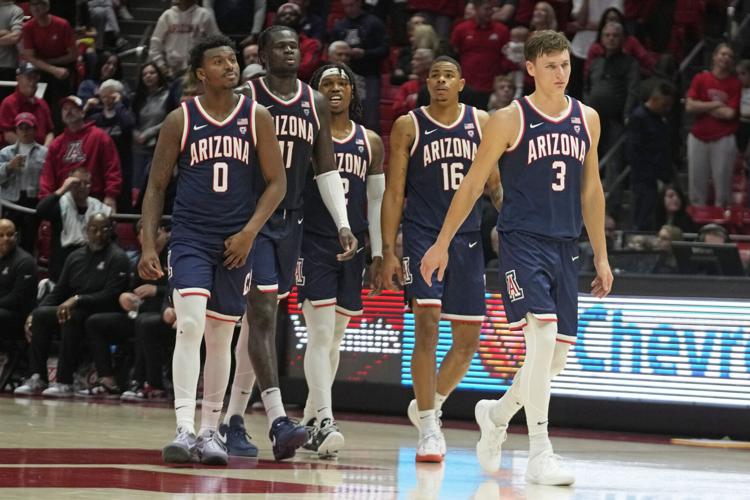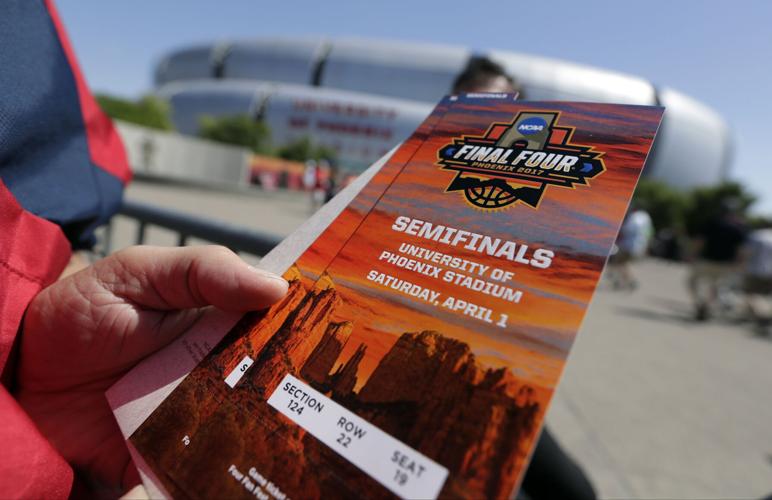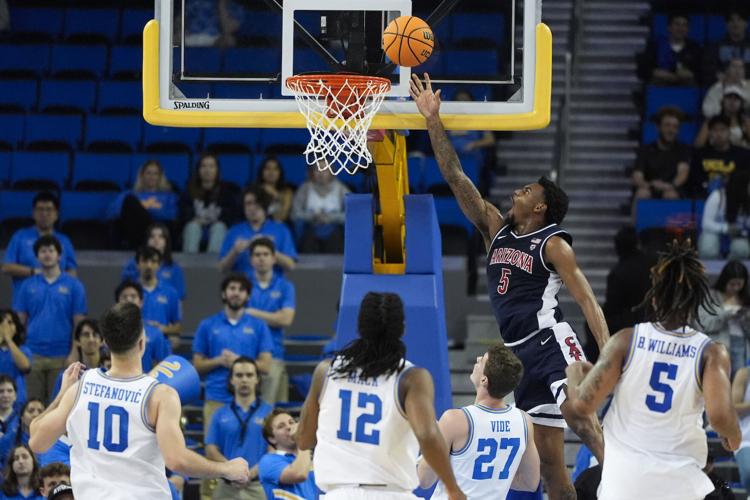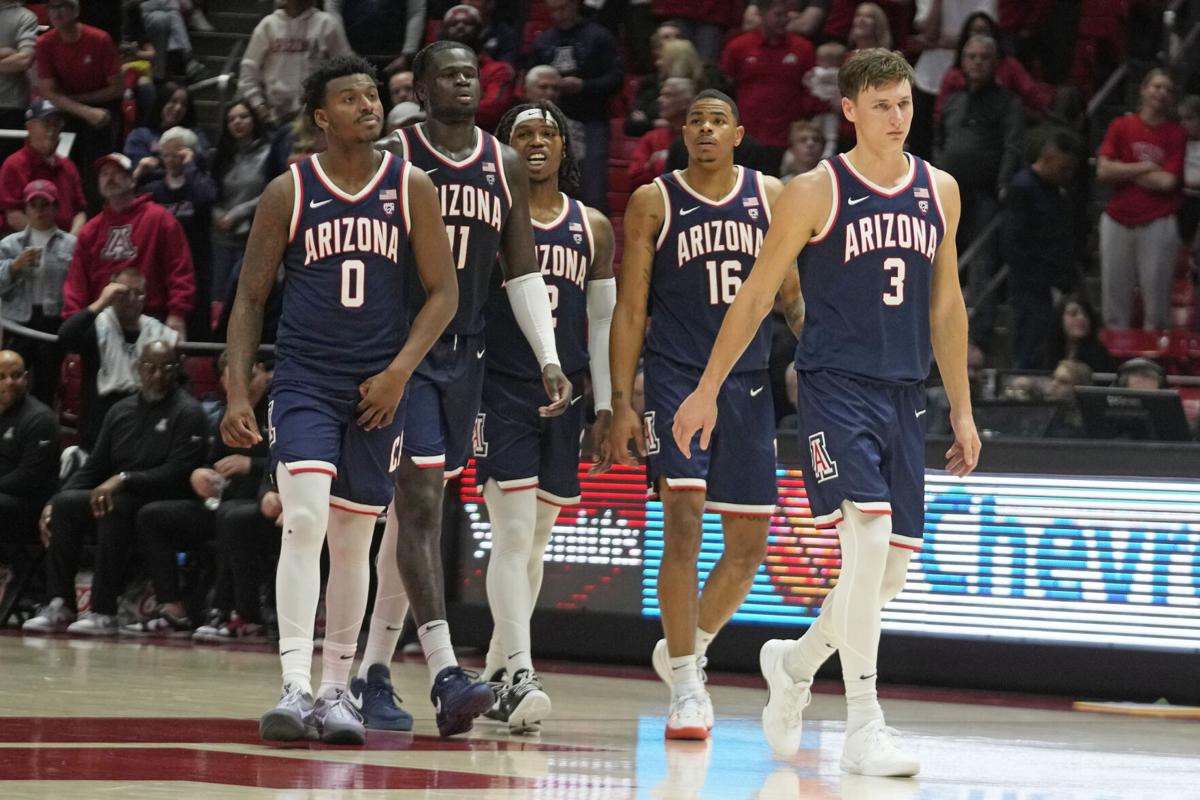The road to the Final Four isn’t really a road. More like a blaze of charter airplane flights, sleep-challenged nights on unfamiliar beds, drama-filled games and maybe an answered prayer or two.
But as far as the actual road, the Arizona Wildcats have that covered.
Not only is the Final Four happening this season just 131 actual road miles away from McKale Center at Glendale’s State Farm Stadium, but in order to get there, the Wildcats also don’t have to travel farther than any state that doesn’t border Arizona. They have first weekend games in Salt Lake City and, if they win two games, opportunities in Los Angeles next weekend.
Their path keeps them firmly in Pac-12 country, to cities where they have gone every season anyway, to play the same sort of Thursday-Saturday split they will play if they keep winning.

The 2024 Final Four marks the second time the NCAA Men's Basketball Tournament's ultimate weekend is in Glendale — just 130 miles, door-to-door, from McKale Center to State Farm Stadium. Last time, Tommy Lloyd was on the court in the 76,000-seat stadium as an assistant coach with Gonzaga. Now that he's Arizona's third-year head coach, do the Wildcats have what it takes to take advantage of their geographical advantage?
And a Regional Final win, on Saturday, March 30, would put Arizona in its first Final Four in 23 years.
So with geography, they’re good.
With everything else, it’s pure guesswork: Will Caleb Love end his three-game shooting slump when it matters most? Can Kylan Boswell confidently and consistently lead the offense? Can Oumar Ballo hit enough free throws?
And will the Wildcats eventually match up against a team with a slower tempo or zone-heavy defense, struggling the way they did against USC in the regular-season finale, against Oregon in the Pac-12 semifinals and, as Arizona fans all too painfully may recall, against Princeton in the first round of last season’s tournament.
Will they face an opponent with big men stretching out to shoot 3-pointers the way Stanford and Oregon State did in their upset wins over UA?
They are questions that can’t be answered now. But the Wildcats just might be equipped to answer enough of them to make a deep run, maybe one that ends up in their home state.
Here's five reasons why:
1. They have things to prove
Unlike how the Wildcats entered the last two NCAA Tournaments, coming off net-snipping, expectation-raising Pac-12 Tournament titles in Las Vegas, Arizona is slinking into this year’s field.
The Wildcats lost to ninth-place USC in their regular-season finale, and after appearing to heal somewhat in a rematch with the Trojans five days later, were bounced by Oregon in the Pac-12 semifinals despite beating the Ducks twice this season. Their NCAA Tournament résumé was scarred by particularly bad losses at Stanford and Oregon State, too.
And that’s just this season. The returning Wildcats such as Ballo, Pelle Larsson and Boswell also took part in their shocking first-round loss to 15th-seeded Princeton in last season’s NCAA Tournament.
“We've never denied it, we've owned it,” UA coach Tommy Lloyd said of that game. “It's part of our history, part of our legacy. When you're in a program like Arizona, you're gonna have great successes, and you're also gonna have some things that look like monumental failures. It's just how it goes.
“So we've never avoided it all year. We talked about it, we openly acknowledged it in our program, we're not embarrassed about it.
“We're looking forward to another opportunity this year. This team's journey is different than last year's journey.”

Pelle Larsson, left, and Caleb Love talk during a a timeout in the win over Oregon on Senior Day on March 2 at McKale Center. Love is no stranger to big performances in the NCAA Tournament, having helped North Carolina to the title game two years ago.
2. They’re healthy and rested
After winning the last two Pac-12 Tournaments, the Wildcats didn’t return home until the early hours of Selection Sunday, then had to brace for a possible Thursday opener in the NCAA Tournament.
In 2020-21, they received a break by getting assigned a Friday opening game in San Diego, but that advantage was reversed when they pulled out a second-round overtime game with TCU on Sunday — and then had to play in San Antonio on the following Thursday against Houston.
“These weeks get really short,” Lloyd said. “You have to save your energy.”
Last season, the Wildcats were assigned a Thursday first-round game and were also coming back from Las Vegas with injuries that severely limited two starters: Point guard Kerr Kriisa separated his shoulder in a quarterfinal game against Stanford, while Ballo broke his left hand in the Pac-12 semifinals against ASU.
This season, the Wildcats left Las Vegas midday on Saturday, and brought back zero known injuries with them.
They haven’t had a single starter miss a single game all season, with Ballo playing through some undisclosed minor injuries earlier in the season and Boswell doing the same after suffering a shoulder injury at Utah on Feb. 8.
Lloyd said he thought the Wildcats are “definitely healthier” than they were last year at this time, while UA's Pac-12 semifinal loss to Oregon allowed them to return home Saturday afternoon.
“I'm being honest with you — I'm so much more well-rested right now standing here than I was the last two years,” Lloyd said after selections were announced Sunday. “The last few years, you're coming here on adrenaline and fumes, and then you just try to rally your energy. I know other teams do it, but it's just not easy for anybody.”
3. They’re more versatile
In Lloyd’s first season of 2021-22, the Wildcats rode the talents of three 2022 NBA Draft picks — aggressive scorer Bennedict Mathurin, shot-blocker Christian Koloko and versatile wing Dalen Terry but their production didn’t go deep.
Last season, the Wildcats had even less depth, heading into the NCAA Tournament with a seven-player rotation that included the banged-up Ballo and Kriisa.
This time, the Wildcats go a full eight deep. They have a seven-footer available full-time at center between Ballo and freshman Motiejus Krivas, while all the other players bring a different skill set: Boswell with playmaking and spot-up shooting, Jaden Bradley with efficient shot-taking and defense, KJ Lewis with a power game on both ends of the court, Keshad Johnson with energy, toughness and defense, Love for pure scoring and Larsson with just about anything you need.
Together, the Wildcats have won in different ways, usually scoring in the 80s, 90s or even 100s, but also playing UCLA’s slower game and beating the Bruins 77-71 at McKale — and digging into their defense to beat USC 70-49 in the Pac-12 Tournament.
The Trojans shot just 35.7% in that game and committed 18 turnovers that led to 16 Arizona points, just five days after USC beat Arizona 78-65 in the regular-season finale at Los Angeles on March 9.
After the game at USC, “one of their players said in the presser that they wanted to be physical with us, so we took that as motivation,” Lewis said after the Pac-12 quarterfinals. “We wanted to be the enforcer today. I think we did a great job. It starts with O (Ballo) and goes to everybody else.”
Overall, the Wildcats enter the NCAA Tournament with not only the eighth-most efficient offense in the nationa but also the 12th-most efficient defense.
They’re versatile.
“I really like this team,” Lloyd said. “This team is capable of winning games in March, and that's the ultimate goal, when you put it together, is to be able to win games in March. I feel like we're capable of that.
“But me feeling more capable doesn't guarantee anything. Now you got to go out and do it.”

Arizona guard KJ Lewis (5) puts up a shot during the second half of the game at UCLA on March 7. The Wildcats will be back in Los Angeles for the Sweet 16 if they can beat Long Beach State and then either Dayton or Nevada this week.
4. They’ve been there (Part I)
The Arizona program may not have been to a Final Four in over two decades, but two Wildcats already have. Caleb Love led North Carolina to the national championship game in 2022, dropping 30 points on UCLA in the Sweet 16 and another 28 on Duke in the national semifinals.
Johnson, meanwhile, played a key energy role in helping San Diego State make a surprising run to the national championship game last season. The Aztecs won four of their first five NCAA Tournament games by single digits before losing to UConn in the title game.
“It means a lot,” Lloyd said of Love’s and Johnson’s experiences. “I think they can send a great message to our team about what it takes in this tournament and what their teams went through.”
In Johnson’s case, he said, it was simple: It’s not a four-game road to the Final Four but a one-game road to the next game.
“You can’t look forward,” Johnson said. “We know if we win this game who we will probably play next but you can't worry about none of that. You’ve got to just study your film. We got Long Beach State coming up and we’ve got to learn their tendencies, learn our game plan and just find something that will work.”
5. They've been there (Part II)
Six weeks ago, Arizona passed through Salt Lake City and outlasted Utah in triple-overtime for a 105-99 win. Two days later, at the mile-high CU Events Center, they then beat up the Pac-12’s third-place team, Colorado, 99-79.
It was the Wildcats’ first sweep of the Pac-12’s “mountain” trip since 2015, the first time they had beaten Colorado in Boulder in five games and, the first time this season that Utah and Colorado lost a home game.
The Wildcats proved comfortable at high altitudes, against difficult opponents, and with a short turnaround time.
“I think it gives us more confidence going into these games because we’ve been through it,” Love said of that trip. “Just playing it gives you a little more experience on how it might go. So I think we're definitely going to be ready.”
This weekend, the Wildcats will be facing a Long Beach State team that, by definition, lives at sea level. A win in that game puts them against Nevada (based at 4,505 feet) or Dayton (742) on Saturday.
Then, if the Wildcats win both games, they’ll be moving on to a city they visited just two weeks ago. In Los Angeles, they drubbed UCLA 88-65 at Pauley Pavilion before losing at USC 78-65.
But Southern California has been somewhat cursed for the Wildcats in the postseason. They advanced to the 1994 Final Four out of L.A., but are just 4-5 since then, losing Elite Eight games in either Orange County or L.A. in 2003, 2011, 2014 and 2015, plus a Sweet 16 game in 2013.
For what it's worth, L.A. is also a straight shot on I-10 to State Farm Stadium. But again, the road itself isn’t really what it takes to reach the Final Four, no matter where it is.
Arizona men's basketball coach Tommy Lloyd, speaking March 12, 2024, at McKale Center, shares what he saw in Oumar Ballo when he recruited him first at Gonzaga, and then again to Arizona when Lloyd left his job as a Gonzaga assistant coach to become head coach in Tucson. (Video courtesy Arizona Athletics)







